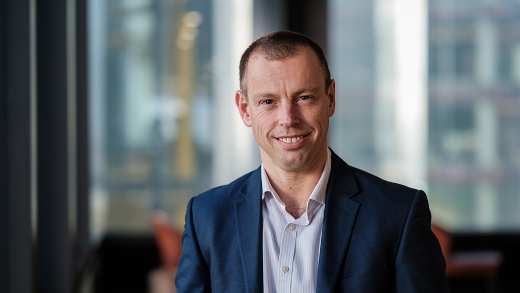Emma, from our bulk purchase annuity (BPA) team, sheds light on the human side of the deals she works on.
Yes, BPA deals are about number crunching.
They’re about risk, and the transference of it.
For Aviva, they’re about growing our business.
But fundamentally, BPAs are about people. Taking care of people.
‘Trustees often have parental instincts,’ Emma says. ‘They want to be sure their pension members are looked after.’
BPAs can help by offering security for their members’ retirement incomes – today and tomorrow.
Sorry, what's that?
Pension trustees – are people responsible for looking after a pension scheme.
Pension members – are people who are entitled to a retirement income from a pension scheme.
Bulk purchase annuities (BPAs) – are financial products used by defined benefit pension trustees to cover the cost of meeting their members’ retirement incomes.
Emma, how did you get into BPA?
I’m an actuary. I first joined the world of BPA nine years ago.
I got a maths degree and then I did actuarial exams on the job.
Often people don’t know what actuaries do and assume you’re an accountant.
Beyond the acronyms and numbers, working in BPA is interesting.
It can be up and down. If you lose a deal, that’s hard, but it’s a high when you win.
At the end of the day, we provide a safe home for members’ pensions.
Our customers – members of defined benefit pension schemes – rely on us to pay their income in retirement.
That’s the human side of BPA.
BPA business is booming. Why’s that?
A lot of pension schemes have benefitted from recent movements in the financial markets.
Because of that, they now have enough funding to consider a BPA.
Schemes that were five plus years away, suddenly they’re ready to do a deal now.
There are too many for us to quote on even if we wanted to - it's such a busy market.
What do you mean by ‘enough funding’ to consider BPA?
Pension schemes have a strategy to make sure they can pay their members’ pension benefits.
Trustees keep an eye on funding all the time and do a formal assessment every three years.
They look at the scheme’s assets compared to its liabilities.
By liabilities, we mean the amount of money they need to meet pension payments as they fall due.
Trustees ask, ‘How well funded is our scheme?’ and the answer will be expressed as a percentage.
If they're 100% funded or more then, in theory, they can pay all their members’ benefits – now and in the future.
It’s a long-term actuarial calculation because some members won't retire for years and years.

So how well funded do schemes need to be to do a BPA deal?
For a full scheme buy-out, schemes need to be more than 100% funded.
That’s because they need enough money to cover the liability of paying members’ benefits and to fund the BPA transaction.
There are other options, such as partial buy-ins, that are possible with lower funding.
Trustees might explore a partial buy-in if a full scheme buy-out isn’t an option for them.
Hang on. What are buy-outs and buy-ins?
There are two types of BPA.
With buy-outs, trustees transfer the entire responsibility, and risk, of their pension scheme to us.
Eventually, we will have the relationship directly with the members instead of the trustees.
With buy-ins, it could be a full scheme transaction, or a partial transaction.
That might be, say, to cover current pensioners but not scheme members who haven’t yet retired.
You can think about a buy-in like an investment for the scheme, where the insurer meets the costs of the benefits, but the trustees are still involved and manage the scheme on a daily basis.
We are seeing more full scheme transactions, I would say, in the last couple of years.
Booming BPA
c.£100-150bn – estimated volumes for the BPA market over 2022-2024
£15-20bn – volume expected to be written by Aviva over 2022-2024
Why do you think that is?
It comes back to recent movements in the financial markets.
Those movements led to an influx of schemes with higher funding levels, ready to consider BPA.
BPA is all about transferring the risks of running a pension scheme to an insurer, like Aviva.
So, once BPA is on the table, trustees often want to seize the moment.
Just because their investments are performing well now, doesn’t mean they always will.
Then there’s inflation risk to think about, and the risk of members living longer than expected.
So what’s in it for us?
BPAs bring in billions of pounds.
You can do a lot with billions to invest.
Our priority is paying insured pension scheme members a retirement income.
Beyond that, we can do good by choosing sustainable investments.
And we can invest in assets that give us good returns, so we can keep writing more business.
We’re not the only BPA provider - how do trustees choose us?
It’s sort of like getting quotes for building work on your home.
Except, trustees hire a consultant to act as a broker for the deal.
Consultants normally approach a handful of insurers - the number depends on the size of the deal.
We'll be asked to submit a quotation and then they'll compare what each insurer can offer.
There might be a second round where they whittle it down to two or three.
Then they may ask for us to present at a pitch meeting.
Does it come down to price in the end?
Price is a massive factor, but it doesn't always come down to that.
They – and we – want to make sure members have a safe home for their pension.
They want to know members will get paid every month, but it’s more than that.
Trustees often have parental instincts – they want to be sure their members are looked after.
That’s important to us, too. We work hard to find new and better ways to develop our service and support members on their retirement journey.
For buy-outs, we have a relationship directly with pension scheme members.
So, trustees ask about admin and how quickly members can get, for example, retirement quotes.
They’re interested in sustainability; they want to know we’re investing for good.
Sometimes they ask me about our values and what it’s like to work here.
Financial strength is important, too. We answer lots of questions about that in pitch meetings.

Do you go to pitch meetings?
Yes, it's nice to get out there. I enjoy it.
Meeting trustees helps me understand their particular needs and what’s important to them.
Being an actuary it’s easy for me to get tied up in numbers and cashflows.
But I like the human side of it, getting out there and meeting people.
What else does your work involve?
I manage relationships with brokers and review BPA deal opportunities when they come to us.
Given the busy market, we have to be selective and consider how prepared schemes are.
When we do decide to quote, I oversee that process.
Lots of people are involved. Analysts work on cashflows, and we have input from pricing and admin.
If trustees decide to go ahead with Aviva, contract negotiations begin.
That’s when legal advisors on both sides get involved.
How long does it take?
Depends on the size of the deal - we look at a wide range of deals.
For a bigger deal, say £500m, we might hear a year in advance that it's coming to market.
For deals less than £100m, a deal could be done in a couple of months.
We’re seeing a lot of demand for <£100m deals.
Because of that, we’ve developed a streamlined way to quote for those deals.
It standardises the process and minimises contract negotiation, so we can offer a quotation and get a transaction done more quickly.
So far, it’s getting good feedback from trustees and consultants.
Tell us about a memorable deal
The British Red Cross deal was a nice one to work on.
We have a big link with them already – we’ve worked together to do a lot of good work.
So when the opportunity came in, we really hoped we could secure it.
I think our existing relationship, and the trust we had built, played a big part.
And what about the future?
It is an exciting time in the BPA market now - a growing market with lots of opportunities.
I think that’s set to continue for at least, I don't know, a decade or more.
One day there will be no schemes left to buy-out, so I don’t think it’ll see me till retirement.
But I don't see it slowing down anytime soon, and our relationship with the members lasts for ever.
Interest piqued?
Read about some of our 2023 BPA deals:
Aviva completes £400m buy-in with Interserve Pension Scheme
Aviva completes £850m pound buy-in with Arcadia Group Pension Schemes
Aviva completes £400m pound bulk annuity deal with Deutsche Bank
Aviva completes £900m pound bulk annuity deal with Thomas Cook
Aviva secures £120m buy-in with NTL 1999 Pension Scheme
Aviva completes £30m pound bulk annuity deal with British Red Cross

















